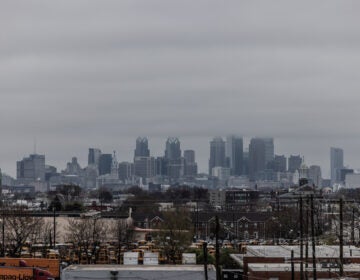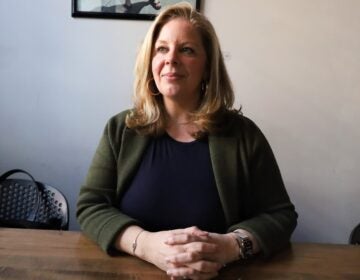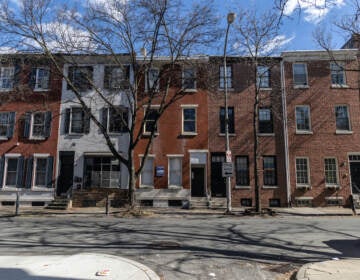Mt. Airy USA reveals three-year strategy
In today’s tough economy, non-profits are being challenged to find creative solutions to successfully pay for projects for which public funds have been significantly reduced. It was against this backdrop that Anuj Gupta, Mt. Airy USA’s executive director, recently outlined his organization’s strategic plan for the remainder of 2012 through 2015.
Gupta, who has helmed the community development corporation for the past two years, presented the overview during East Mount Airy Neighbors’ monthly meeting last week. He stressed throughout his time that MAUSA will need to be creative as it faces “massive, massive reductions in public support.”
A challenging time for tackling blight
Key to MAUSA’s mission of revitalizing the Northwest Philadelphia neighborhood is the acquisition and rehabilitation of blighted properties. Gupta noted that the organization wants to be more aggressive about obtainining more vacant buildings and putting them “back into productive use.”
However, between a national budget crisis, deep cuts at the state level and philanthropic organizations which have steered away from supporting community development, Gupta said traditional sources of public support no longer exist.
Blighted properties account for a sizable portion of Philadelphia real estate. Gupta warned that without some form of public funding these sites will not receive the attention needed for rehabilitation.
“There is a consequence to all of these development subsidy programs being cut or eliminated. There are properties where the economics simply will not make sense,” said Gupta, noting that the high cost of construction often drives up sale and even rental prices.
For his part, Gupta thinks this economic trend will dissuade all developers, including non-profit developers like MAUSA.
A need for partnerships
MAUSA still receives public support for its housing counseling services, but Gupta says those funds have also been substantially cut.
MAUSA’s support from he U.S. Department of Housing and Urban Development has been reduced by half.
Its housing counseling services also suffered when Gov. Tom Corbett eliminated the Homeowners’ Emergency Mortgage Assistance Program (HEMAP) last summer, said Gupta.The state foreclosure assistance program, established in 1983, was reinstated in August.
As a result of diminished support, Gupta said MAUSA has taken a “much more aggressive approach to partnering” with financial institutions.
“We have to be innovators,” he said.
One of the key ways MAUSA is achieving this is by building strong partnerships, particularly with other neighborhood associations like EMAN. Gupta said that MAUSA will also be looking into consulting with Germantown-based community organizations as a potential development partner.
Another way MAUSA plans to deal with reduced public support is to develop a social equity investment fund.
The fund will allow local investors to put their money into an acquisition and construction pool “and see their dollars go to work right here in their community,” explained Gupta.
Organization expands property holdings
In the meantime, MAUSA’s will continue to focus on commercial property development, particularly along Germantown Avenue.
The organization will soon begin the rehabilitation of four mixed-use properties in the 6500 and 6700 blocks of their namesake neighborhood’s main commercial corridor.
Gupta added, though, that for the first time in its history, MAUSA has acquired two residential properties in East Mount Airy, which it will rehab without public funding.
The two buildings are located south of Phil Ellena Street and will be sold to moderate-income home owners.
“We’re going to get much heavier into residential property development with a focus on multi-unit buildings,” said Gupta.
‘Place-making’ to become a new focus
Besides commercial and residential real estate development, Gupta acknowledged that MAUSA is now “getting into the business of place-making”.
One example of this is MAUSA’s proposed redesign of Lovett Park.
Gupta announced that MAUSA has raised enough money to complete the construction drawings for the park’s redevelopment. The project’s first phase will be the creation of a pedestrian plaza.
MAUSA hopes to transform the park into a destination green space and will be looking to develop special events for the park.
Business Association update
Gupta also reported that six months after its launch, the Business Association of Mt. Airy currently has 70 members. The association is an initiative of MAUSA and a resurrection of the former Mt. Airy Business Association (MABA).
After the Germantown Avenue streetscape improvements were completed in 2011, MAUSA decided to shift into promoting the neighborhood’s business community to the broader region.
BAM took over what it saw as declining interest in First Friday happenings and rebranded it as Final-ly Friday.
The event has been held every last Friday of the month since April as a way to highlight local restaurants and retailers. BAM has also introduced a neighborhood portal website, GoMtAiry.com.
Gupta says MAUSA is exploring the feasibility of becoming a community development financial institution. Doing so will enable MAUSA to get into micro-lending and small business lending, something which the organization has not been able to do to date.
WHYY is your source for fact-based, in-depth journalism and information. As a nonprofit organization, we rely on financial support from readers like you. Please give today.




